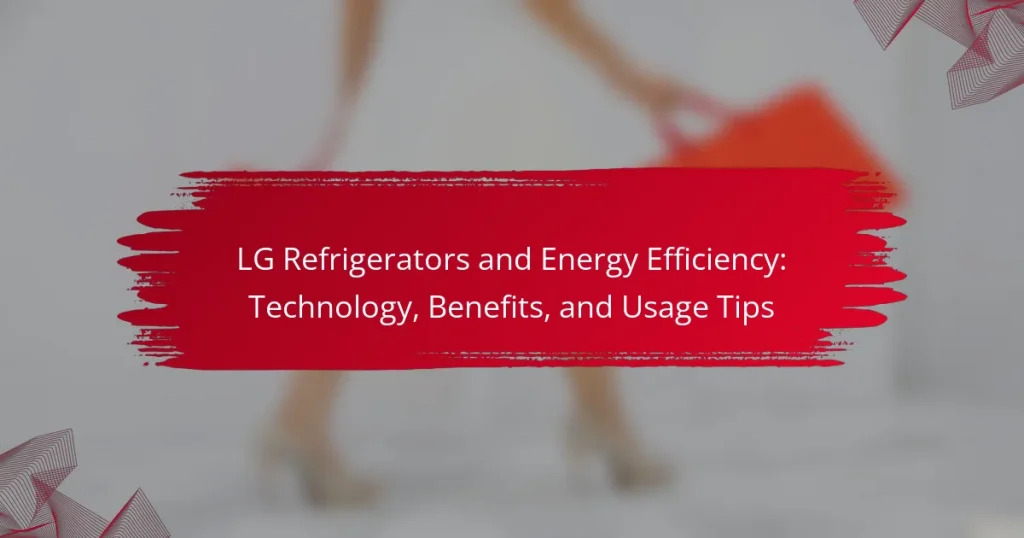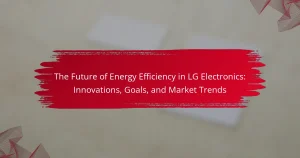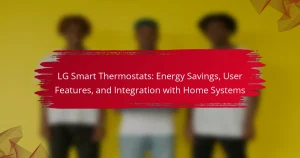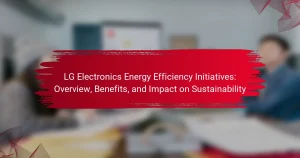LG Refrigerators are advanced cooling appliances designed to enhance food preservation while maximizing energy efficiency. These refrigerators feature innovative technologies such as inverter compressors and Smart Diagnosis capabilities, which adjust cooling power based on demand and allow for remote troubleshooting via smartphone apps. With ENERGY STAR certification, LG models can save consumers up to 30% on energy bills compared to traditional units. The multi-air flow system ensures even cooling, while the Door-in-Door design provides convenient access to frequently used items, further optimizing performance. This article will explore the technology, benefits, and best usage practices for LG Refrigerators, highlighting their role in reducing household energy consumption and maintaining food quality.
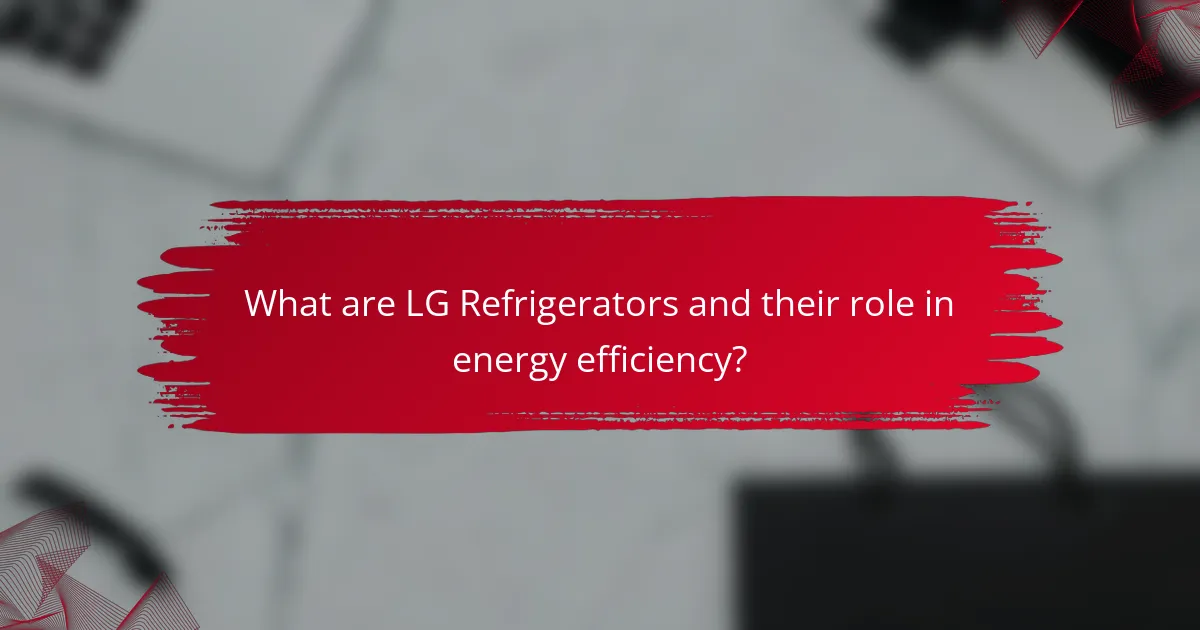
What are LG Refrigerators and their role in energy efficiency?
LG Refrigerators are advanced cooling appliances designed for optimal food preservation. They utilize innovative technologies to enhance energy efficiency. Features such as inverter compressors adjust cooling power based on demand. This reduces energy consumption significantly compared to traditional models. LG refrigerators often carry ENERGY STAR certification, indicating they meet strict energy efficiency guidelines. According to the U.S. Department of Energy, ENERGY STAR appliances can save consumers up to 30% on energy bills. Additionally, smart technology in LG models allows for remote monitoring and adjustments, further optimizing energy use. Overall, LG Refrigerators play a crucial role in reducing household energy consumption while maintaining food quality.
How do LG Refrigerators achieve energy efficiency?
LG Refrigerators achieve energy efficiency through advanced technologies like Inverter Linear Compressor and Smart Diagnosis. The Inverter Linear Compressor adjusts cooling power based on the amount of food inside. This technology reduces energy consumption by up to 32% compared to traditional compressors. Additionally, LG Refrigerators utilize LED lighting, which consumes less energy and lasts longer than conventional bulbs. The design also includes better insulation materials that minimize energy loss. These features collectively contribute to lower electricity bills and a reduced carbon footprint.
What technologies are employed in LG Refrigerators for energy savings?
LG Refrigerators utilize several technologies for energy savings. One key technology is the Inverter Compressor. This compressor adjusts its speed based on cooling demand, which reduces energy consumption. Another technology is Smart Diagnosis. This feature allows users to troubleshoot issues efficiently, minimizing energy waste. Additionally, LG employs LED lighting, which consumes less energy compared to traditional bulbs. The Linear Cooling technology maintains consistent temperatures, enhancing efficiency. These technologies collectively contribute to LG Refrigerators’ energy-saving capabilities.
How does the design of LG Refrigerators contribute to energy efficiency?
LG Refrigerators are designed with advanced technologies that enhance energy efficiency. Their inverter compressors adjust cooling power based on demand, reducing energy consumption. The Smart Diagnosis feature helps identify issues quickly, preventing energy waste. Additionally, LG’s multi-air flow system ensures even cooling, minimizing the need for excessive energy use. The use of high-quality insulation materials reduces heat exchange, maintaining internal temperatures with less energy. Furthermore, LED lighting consumes less energy compared to traditional bulbs, contributing to overall efficiency. These design elements collectively support LG Refrigerators in achieving energy-efficient performance.
What are the benefits of using LG Refrigerators?
LG Refrigerators offer several benefits, including energy efficiency, advanced technology, and spacious designs. Their energy-efficient models can reduce electricity bills by up to 20% compared to non-efficient models. LG incorporates smart technology, allowing users to control settings remotely via smartphone apps. Many models feature a linear compressor, which provides better temperature control and quieter operation. LG Refrigerators are designed with flexible storage options, accommodating various food items easily. They also include features like water and ice dispensers for convenience. Additionally, LG’s innovative cooling systems help maintain freshness longer, reducing food waste.
How do LG Refrigerators impact household energy consumption?
LG refrigerators significantly reduce household energy consumption. They utilize advanced energy-efficient technologies. These include inverter compressors that adjust cooling based on need. LG models often exceed Energy Star certification standards. This results in lower electricity bills for users. For instance, some LG refrigerators consume as little as 350 kWh per year. This efficiency contributes to overall reduced carbon footprints. Enhanced insulation also minimizes energy loss in LG designs. Consequently, households benefit from both savings and environmental impact.
What features enhance the usability of LG Refrigerators?
LG Refrigerators feature Smart Inverter Compressor technology that optimizes energy use. This technology adjusts cooling based on the amount of food inside. It helps maintain consistent temperatures while reducing energy consumption. Additionally, LG models include a Door-in-Door feature for easy access to frequently used items. This design minimizes cold air loss when retrieving items.
Another key feature is the Smart Diagnosis system. This allows users to troubleshoot issues quickly using a smartphone app. Furthermore, LG Refrigerators often come with a linear cooling system. This system ensures even temperature distribution throughout the fridge. It prevents temperature fluctuations that can spoil food.
Many models also offer adjustable shelves and bins. These features provide customizable storage options for various food items. Lastly, some LG Refrigerators include Wi-Fi connectivity. This allows users to monitor and control settings remotely, enhancing usability.

How does the technology in LG Refrigerators work?
LG Refrigerators utilize advanced technology for optimal cooling and energy efficiency. They employ a linear compressor that adjusts cooling power based on the internal temperature. This technology reduces energy consumption by up to 32% compared to traditional compressors. LG’s Smart Diagnosis feature allows users to troubleshoot issues via a smartphone app. The refrigerators also have a multi-air flow system, ensuring even cooling throughout the unit. Additionally, LG’s Door-in-Door design provides easy access to frequently used items, minimizing cold air loss. The use of inverter technology further enhances energy savings and temperature control. Overall, these features work together to improve efficiency and user convenience.
What specific energy-saving technologies are found in LG Refrigerators?
LG Refrigerators incorporate several specific energy-saving technologies. These include the Inverter Compressor, which adjusts cooling power based on the internal temperature. This technology reduces energy consumption by operating more efficiently. LG also utilizes Smart Diagnosis, allowing for quick troubleshooting and maintenance, which helps maintain optimal performance. Additionally, the Energy Star certification indicates that LG Refrigerators meet strict energy efficiency guidelines set by the EPA. The Linear Compressor technology further enhances energy savings by minimizing energy loss. These features collectively contribute to lower electricity bills and a reduced environmental impact.
How does inverter technology improve energy efficiency?
Inverter technology improves energy efficiency by adjusting the compressor’s speed based on cooling demand. This allows the refrigerator to maintain a consistent temperature with less energy consumption. Traditional compressors operate at fixed speeds, cycling on and off, which wastes energy during the off periods. In contrast, inverter compressors can run continuously at varying speeds, using only the energy needed for the current conditions. Studies show that inverter technology can reduce energy usage by up to 30% compared to conventional models. This efficiency not only lowers electricity bills but also extends the lifespan of the appliance.
What role does smart technology play in LG Refrigerators?
Smart technology in LG Refrigerators enhances user convenience and energy efficiency. It allows remote monitoring and control via smartphone apps. Users can adjust temperature settings and receive alerts for maintenance needs. Smart features include food inventory tracking and expiration date notifications. These capabilities help reduce food waste and optimize storage. LG’s smart technology also integrates with voice assistants for hands-free operation. This connectivity supports energy-saving modes based on usage patterns. Overall, smart technology significantly improves the functionality and efficiency of LG Refrigerators.
Why is energy efficiency important for consumers?
Energy efficiency is important for consumers because it reduces energy costs and lowers environmental impact. By using energy-efficient appliances, consumers can save money on utility bills. According to the U.S. Department of Energy, energy-efficient products can save households approximately 25% on energy bills. Additionally, energy efficiency contributes to a reduction in greenhouse gas emissions. This helps combat climate change and promotes a healthier environment. Energy-efficient appliances often have longer lifespans, providing better value over time. They also enhance comfort by maintaining consistent temperatures. Overall, energy efficiency benefits consumers financially and environmentally.
How does energy efficiency affect long-term costs for users?
Energy efficiency significantly reduces long-term costs for users. Efficient appliances consume less electricity, leading to lower utility bills. For instance, ENERGY STAR-rated refrigerators can save users $200 or more over their lifetime. This reduction in energy consumption minimizes environmental impact as well. Additionally, energy-efficient models often have longer lifespans due to better technology and materials. Users can also benefit from potential rebates or tax incentives for purchasing energy-efficient appliances. Overall, choosing energy-efficient options like LG refrigerators leads to substantial savings and financial benefits over time.
What environmental benefits are associated with energy-efficient appliances?
Energy-efficient appliances reduce energy consumption, leading to lower greenhouse gas emissions. They use less electricity, which decreases the demand on power plants. This reduction in demand can lessen air pollution from fossil fuel combustion. Energy-efficient appliances often use advanced technology to optimize performance while minimizing waste. For example, ENERGY STAR-rated appliances consume up to 50% less energy than standard models. This efficiency translates to significant savings in energy costs for consumers. Additionally, less energy consumption contributes to the conservation of natural resources. Overall, energy-efficient appliances play a crucial role in promoting environmental sustainability.
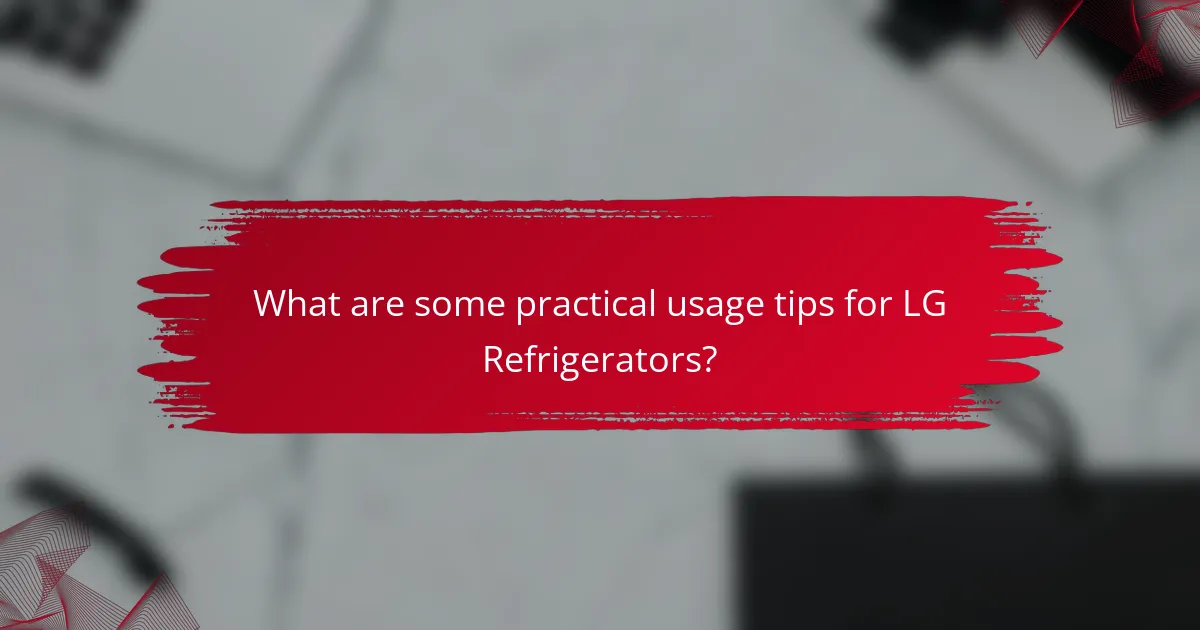
What are some practical usage tips for LG Refrigerators?
Keep the refrigerator at the optimal temperature of 37°F (3°C) for food preservation. This temperature helps maintain freshness and prevents spoilage. Regularly check and clean the door seals to ensure they are airtight. This prevents cold air from escaping and improves energy efficiency. Organize food items by category and frequency of use. This improves accessibility and reduces the time the door is open. Avoid overloading the refrigerator, as it can restrict airflow and reduce cooling efficiency. Use the LG Smart Diagnosis feature for troubleshooting issues quickly. This feature provides instant feedback on appliance performance. Regularly defrost the freezer if it does not have a frost-free feature. This maintains efficiency and maximizes storage space. Lastly, ensure proper ventilation around the refrigerator for optimal performance. This allows the appliance to operate efficiently without overheating.
How can users maximize energy efficiency in their LG Refrigerators?
Users can maximize energy efficiency in their LG Refrigerators by maintaining optimal temperature settings. The recommended temperature for the refrigerator is 37°F (3°C) and 0°F (-18°C) for the freezer. Regularly checking and cleaning the door seals ensures they are airtight, preventing cold air from escaping. Keeping the refrigerator well-stocked helps maintain temperature stability. Avoid placing hot food directly into the refrigerator, as this can raise the internal temperature. Users should also ensure proper ventilation around the fridge to allow heat dissipation. Cleaning the condenser coils every six months boosts efficiency by improving heat exchange. Lastly, utilizing the energy-saving mode, if available, can further reduce power consumption.
What maintenance practices contribute to energy efficiency?
Regular maintenance practices that contribute to energy efficiency include cleaning condenser coils, checking door seals, and ensuring proper temperature settings. Cleaning condenser coils every six months improves airflow and cooling efficiency. Faulty door seals can lead to temperature fluctuations, causing the refrigerator to work harder. Regularly inspecting and replacing worn seals can minimize energy loss. Setting the refrigerator temperature between 35°F and 38°F optimizes energy use while keeping food fresh. Additionally, defrosting freezers that accumulate frost can enhance energy efficiency. Implementing these practices can reduce energy consumption significantly, leading to lower utility bills and improved appliance longevity.
How should food be organized to optimize performance?
Food should be organized in a refrigerator to optimize performance by placing items based on their temperature needs. Perishable items like dairy and meats should be stored in the coldest parts, typically the bottom shelves. Fruits and vegetables should be placed in designated crisper drawers to maintain humidity levels. Leftovers and ready-to-eat foods should be easily accessible on middle shelves. Proper organization prevents cross-contamination and maintains freshness. Studies show that well-organized refrigerators can improve energy efficiency by allowing air to circulate freely. This promotes optimal cooling and reduces energy consumption.
What troubleshooting tips can help maintain energy efficiency in LG Refrigerators?
To maintain energy efficiency in LG Refrigerators, regularly check and clean the condenser coils. Dirty coils can cause the refrigerator to work harder, increasing energy consumption. Ensure that the refrigerator door seals are intact and clean. Damaged seals can lead to air leaks, which waste energy. Set the refrigerator temperature to the recommended range of 37°F to 40°F. This helps optimize cooling without excessive energy use. Additionally, keep the refrigerator well-organized to ensure proper airflow. Overloading can restrict airflow, causing the appliance to use more energy. Regularly defrost manual defrost models to prevent ice buildup, which can hinder efficiency. Lastly, ensure the refrigerator is leveled to maintain optimal operation. An unlevel unit can cause the appliance to work inefficiently.
What common issues affect energy consumption in LG Refrigerators?
Common issues affecting energy consumption in LG Refrigerators include dirty condenser coils, faulty door seals, and incorrect temperature settings. Dirty condenser coils reduce efficiency by obstructing airflow. Faulty door seals allow cold air to escape, causing the compressor to work harder. Incorrect temperature settings can lead to excessive energy use, as temperatures that are too low increase cycling time. Regular maintenance can mitigate these issues, ensuring optimal performance and energy efficiency.
How can users identify and resolve energy efficiency problems?
Users can identify energy efficiency problems in LG refrigerators by monitoring energy bills for unusual spikes. Checking the temperature settings is essential; they should be between 37°F and 40°F for optimal efficiency. Inspecting door seals for damage can reveal air leaks that waste energy. Cleaning the condenser coils regularly helps maintain efficiency by improving heat exchange. Users can also listen for unusual noises, which may indicate mechanical issues affecting performance. Additionally, using an energy monitor can provide real-time data on energy consumption. Resolving these issues often involves simple repairs or adjustments, such as replacing seals or adjusting temperature settings. Regular maintenance can prevent future problems and enhance energy efficiency.
LG Refrigerators are advanced cooling appliances engineered for optimal food preservation and energy efficiency. This article explores the innovative technologies employed in these refrigerators, such as inverter compressors and smart diagnosis features, which significantly reduce energy consumption and enhance usability. It highlights the benefits of using LG Refrigerators, including lower electricity bills and environmental impact, while also providing practical usage and maintenance tips to maximize energy efficiency. Overall, the content emphasizes the role of LG Refrigerators in promoting sustainable household practices through cutting-edge technology and design.
